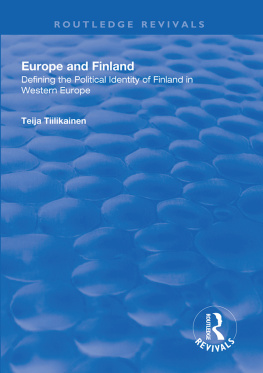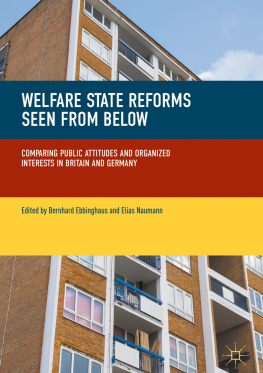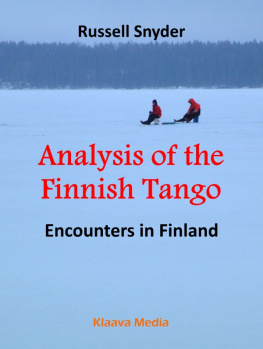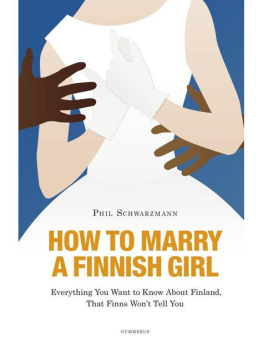CORPORATISM AND THE MYTH OF CONSENSUS
Corporatism and the Myth of Consensus
Working hours legislation in Finland in the 1990s
ROGER BOBACKA
University o f Aberdeen, Scotland, UK
First published 2001 by Darthmouth Publishing Company and Ashgate Publishing
Reissued 2018 by Routledge
2 Park Square, Milton Park, Abingdon, Oxon OX14 4RN
711 Third Avenue, New York, NY 10017, USA
Routledge is an imprint of the Taylor & Francis Group, an informa business
Copyright Roger Bobacka 2001
All rights reserved. No part of this book may be reprinted or reproduced or utilised in any form or by any electronic, mechanical, or other means, now known or hereafter invented, including photocopying and recording, or in any information storage or retrieval system, without permission in writing from the publishers.
Notice:
Product or corporate names may be trademarks or registered trademarks, and are used only for identification and explanation without intent to infringe.
Publishers Note
The publisher has gone to great lengths to ensure the quality ofthis reprint but points out that some imperfections in the original copies may be apparent.
Disclaimer
The publisher has made every effort to trace copyright holders and welcomes correspondence from those they have been unable to contact.
A Library of Congress record exists under LC control number: 00111839
ISBN 13: 978-1-138-71833-3 (hbk)
ISBN 13: 978-1-315-19589-6 (ebk)
Contents
The book is in eight chapters. After the introduction, which presents a brief contextualisation of contemporary Finnish politics, is to focus on consensus building in practice. This approach is concerned with an evaluation of the practical tasks the participants face in building consensus within a corporatist context.
Chapter three examines working hours and interest intermediation in Finland. There are two aims of this chapter. The first one is to evaluate what the development of working hours regulations can tell about the broad picture of interest intermediation on the labour market in Finland. The second aim is a question of whether this points to a model of Finnish labour market policy making.
The aim of .
The first aim of is therefore to evaluate whether the process has been characterised by participants who have been free from external constraints, equal in the sense that none of them have gained special advantages or disadvantages; and reasonable in their arguments in that they defend them in a way that others have a reason to accept.
In , the role of the parliament in the decision making process is analysed, including an in-depth evaluation of the role that the parliamentary Committee for Labour Affairs plays in Finnish labour market policy making. The aim is to evaluate whether the Finnish parliament is still as subservient to pressure group influence in the 1990s, when it comes to labour market policy making, as was commonly regarded to be the case in the 1970s. The chapter is divided into three parts. In the first, the formal decision making procedures in parliament are explained. In the second, the parliamentary deliberation of the working hours case is evaluated, and in the third, there is a discussion on whether or not there is a democratic deficit in Finnish labour market policy making.
The objective of is to evaluate how the new working hours act has been put into practice and how it has affected the individual workers and employers. This chapter also makes a comparison between a corporate pluralist Finland and a non-corporatist UK. Do the different labour market policies between a highly regulated Finland and an unregulated UK reflect how working hours are arranged on the shop floors?
evaluates what the working hours case can tell about Finnish labour market policy making in the 1990s. The overall objective is an elaboration on the possible side effects of corporate pluralist arrangements as a means of creating consensus.
There are numerous people who have assisted me in the completion of the book, which is also my PhD thesis. Without the help of Kari-Pekka Tiitinen at the University of Helsinki and Esa Lonka at the Ministry of Labour, my empirical material would have been significantly thinner than it turned out to be. Many thanks also to MPs Reijo Lindroos, Anne Huotari, Raimo Tiilikainen, Kari Kantalainen, Armas Komi and Outi Siimes for invaluable information about the parliamentary Committee for Labour Affairs.
The Nordic Policy Studies Centre and the Department of Politics and International Relations at the University of Aberdeen has provided me with excellent support when it comes to travel costs and a hospitable environment. The greatest thanks goes to my adviser David Arter, who supported me with both critical comments and supporting advice. Without him, the completion of the thesis would still be in the future. Many thanks also to Grant Jordan for his supportive comments from a non-Finnish perspective.
The book is dedicated to my wife Morag. She spent many hours checking my non-standard use of the English language, urging me to go on although I was ready to call it a day. She has convinced me that there is also life after completing a PhD thesis.
Roger Bobacka
Old Aberdeen
AKAVA Confederation of Unions for Academic Professionals in Finland
CBI Confederation of British Industry
ECJ European Court of Justice
EMU European Monetary Union
ETUC European Trade Union Confederation
EU European Union
EVA Centre for Finnish Business and Policy Studies
FCMA Treaty of Friendship, Co-operation and Mutual Assistance
FNV The Netherlands Trade Union Confederation
ILO International Labour Organisation
KT Commission for Local Authority Employers, Finland
LO Confederation of Trade Unions, Sweden
MP Member of Parliament
MTK Confederation of Farmers and Forestry Owners, Finland
OECD Organisation for Economic Co-operation and Development
PSI Policy Studies Institute
SAF Swedish Federation of Employers
SAK Central Organisation of Finnish Trade Unions
SDP Social Democratic Party
SFP Swedish Peoples Party, Finland
SKDL Finnish Peoples Democratic League
STK National Employers Federation, Finland (19071992)
STTK Finnish Confederation of Salaried Employees
SY Federation of Finnish Enterprises
TPSL Social Democratic League in Finland
TT Confederation of Finnish Industry and Employers (1992-)
TUC Trades Union Congress, Great Britain
VTML Department of Public Personnel Management, Finland
This book represents a case study of one of the most central features of the labour market working hours. Before the industrialisation era started in Europe in the late eighteenth and early nineteenth centuries, working hours had to a large extent been dictated by the cycles of the seasons of nature. The industrialisation era brought in new insights to the concept of working hours through the growing use of machines in production. A common assumption among owners of industrial companies became that production could be increased by increasing the number of working hours. The time spent at work for industrial workers therefore became largely dictated by the operating hours of machines, resulting in a significant increase in the length of working hours. The use of children in industrial production was also common, and they usually worked the same number of hours as adults. The first demands for working hour regulations were therefore based on a need for shortened working hours for children, prompted by needs to secure their safety and health. The result was that, in England, for example, the first working hour reguation was enacted in 1847, limiting work for children (and women) in the textile industry to ten hours daily. In Finland, the first working hours regulation was enacted in 1868, setting the minimum age of workers to 12 years of age.1 The first regulation for adults in Finland was enacted in 1909 (act on work in bakeries), and in 1917, the parliament enacted a general law on eight-hour working days.2













